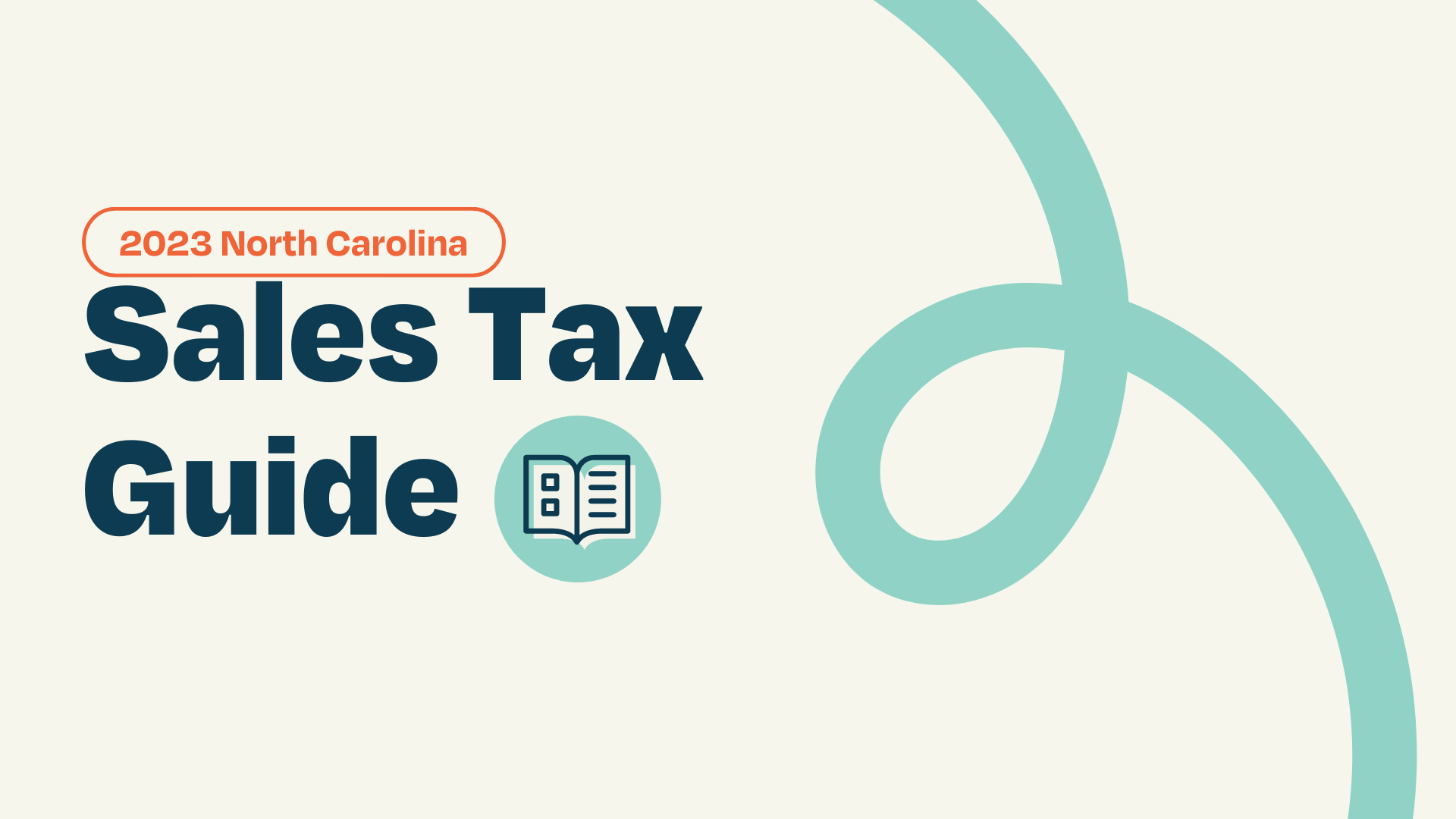1 min read
North Carolina 2023 Sales Tax Guide
North Carolina Sales Tax in a Word As a small business owner, navigating the world of sales tax can feel like a rollercoaster ride. One moment...

Hey there, small business superheroes! Are you ready to conquer the world of sales tax filing in Michigan? You've come to the right place! In this comprehensive guide, we'll walk you through the essentials of filing and paying sales taxes in the Great Lakes State. From understanding your filing frequency and due dates to navigating exemptions and avoiding common pitfalls, we've got you covered.
But fear not, intrepid entrepreneurs, for we at Accountingprose are your trusty sidekicks on this sales tax adventure. Our mission is to empower you with the knowledge and confidence you need to conquer sales tax filing with ease.
So, strap on your capes and let's dive into the thrilling world of Michigan sales tax filing! Together, we'll ensure your small business continues to soar to new heights.
|
Table of Contents |
When it comes to Michigan sales tax, it's essential to know who's in charge and how to communicate with them. In this section, we'll introduce you to the tax authorities responsible for managing Michigan sales tax and provide their contact information to ensure you have direct access to the experts.
The Michigan Department of Treasury is the state agency responsible for administering sales tax, along with other state taxes and revenue collection. The Department of Treasury is your go-to source for all things related to Michigan sales tax, including registration, filing, payment, and compliance.
You can contact the Michigan Department of Treasury through various channels, depending on your needs and preferences:
General Phone: For general inquiries related to sales tax, you can reach the Department of Treasury by calling their main phone line at (517) 636-6925.
Mailing Address: If you need to send correspondence or documents to the Department of Treasury via mail, their mailing address is:
Michigan Department of Treasury
Lansing, MI 48922
Michigan Treasury Online: For online sales tax filing, payment, and account management, visit the Michigan Treasury Online website here.
Now that you have the Michigan sales tax authorities' contact information, you can confidently reach out for guidance, support, and expert advice whenever you need it. And, of course, your reliable partners at Accountingprose are always here to help you navigate the sales tax landscape and ensure your small business stays on track.
Hello, intrepid small business owners! As you venture into the realm of Michigan sales tax, it's crucial to determine whether your business has Nexus in the Wolverine State. Fear not, for we're here to help you understand the various types of Nexus that may apply to your business.
In the world of sales tax, Nexus is a connection or presence that a business has within a state, which then triggers the responsibility to collect and remit sales tax on taxable transactions. In Michigan, there are several types of Nexus that can be established, each with its own unique criteria. Let's explore these categories in more detail below.
Physical nexus is established when your business has a tangible presence within Michigan, such as:
Owning or leasing property (e.g., office, warehouse, storefront)
Employing sales representatives or other personnel
Storing inventory in a Michigan warehouse, even if owned by a third party
If your business meets any of these criteria, you'll need to begin collecting and remitting sales tax in Michigan.
Economic nexus is established when your business meets certain sales thresholds within Michigan. As of October 1, 2018, economic nexus is triggered when your business has:
More than $100,000 in sales, or
At least 200 separate transactions
These thresholds apply to a calendar year. If your business surpasses these limits, it's time to comply with Michigan sales tax regulations.
Affiliate nexus occurs when your business has a relationship with another entity in Michigan that helps promote or facilitate sales. Examples of relationships that may create affiliate nexus include:
Using a Michigan-based affiliate to advertise or promote your products
Sharing management, business systems, or employees with a Michigan-based entity
If your business has any of these connections in Michigan, you'll need to navigate the sales tax landscape accordingly.
Click-through nexus comes into play when your business has an agreement with a Michigan-based affiliate who refers customers to your website through a link or advertisement. If the cumulative gross receipts from these referrals exceed $10,000 during the preceding 12 months, you'll need to comply with Michigan sales tax regulations.
Marketplace nexus is established when your business sells goods through a marketplace facilitator, like Amazon or eBay, and that facilitator has nexus in Michigan. In this case, the marketplace facilitator is responsible for collecting and remitting sales tax on your behalf, but you'll still need to be aware of any additional sales tax obligations that may arise from your other business activities.
As you delve into the Michigan sales tax realm, it's essential to understand the various types of Nexus and how they may apply to your small business. And remember, your dependable team at Accountingprose is always here to help you navigate these complexities and ensure a smooth journey through your sales tax journey.
Greetings, small business dynamos! If you've determined that your business has Nexus in Michigan, it's time to register for a Michigan sales tax license. In this section, we'll guide you through the registration process and provide essential information to help get your business up and running in the Great Lakes State.
Registering for a Michigan sales tax license is a breeze when you follow these simple steps:
Determine your business structure: Before registering for a sales tax license, make sure you've determined your business structure, such as a sole proprietorship, partnership, LLC, or corporation. This will impact the type of tax license you'll need and the registration process.
Obtain a Federal Employer Identification Number (EIN): If you don't already have one, apply for an EIN from the IRS, as it will be required during the registration process.
Gather necessary information: Before completing your sales tax registration, gather essential information about your business, including your EIN, business name, legal structure, mailing address, business location(s), and contact information.
Visit the Michigan Treasury Online (MTO) website: Head to the Michigan Treasury Online (MTO) website to begin the registration process.
Create an MTO account: If you don't already have an account, click on "Create a New MTO Account" and follow the prompts to set up your account.
Log in and select "Register a New Business": Once you're logged into your MTO account, click on "Register a New Business" to begin the sales tax registration process.
Complete the online registration form: Fill out the registration form with the necessary information about your business. Be thorough and accurate to avoid any delays or issues with your sales tax license.
Submit your registration: After completing the online form, click "Submit" to send your registration to the Michigan Department of Treasury for processing. You'll receive a confirmation number for your records.
Wait for approval: Once submitted, the Department of Treasury will review your sales tax registration. This process typically takes 7-10 business days. You'll receive a confirmation email with your sales tax license number once approved.
Display your sales tax license: Upon receiving your sales tax license number, ensure it's prominently displayed at your place of business, as required by Michigan law.
Great news! Registering for a Michigan sales tax license is absolutely free. There's no fee to apply or maintain your license, so you can focus on growing your business without worrying about additional costs.
Yes, you will need a Federal Tax ID Number, also known as an Employer Identification Number (EIN), to register for a Michigan sales tax license. If you don't already have one, you can apply for an EIN online through the IRS website.
Depending on your business type and activities, you may need to register with other Michigan agencies in addition to the Department of Treasury. Some common agencies and registrations include:
Michigan Department of Licensing and Regulatory Affairs (LARA): Register your business entity, such as an LLC or corporation, and obtain necessary licenses or permits.
Michigan Unemployment Insurance Agency (UIA): Register for unemployment insurance if you have employees.
Michigan Workers' Compensation Agency: Obtain workers' compensation insurance if required for your business.
Navigating the Michigan sales tax registration process is a breeze when you follow these steps and keep the essential information at your fingertips. And remember, your trusty team at Accountingprose is always here to help you through the process and ensure your small business operates smoothly in the Wolverine State.
Hey there, small business superheroes! Now that you're registered for a Michigan sales tax license, it's time to tackle the process of collecting sales tax in the Wolverine State. From understanding origin vs. destination sales tax to knowing which items are exempt, we've got you covered with all the essential information to keep your business running smoothly.
Michigan is a destination-based sales tax state. This means that sales tax is collected based on the location where the buyer takes possession of the item or where the item is shipped. As a small business owner, you'll need to determine the appropriate sales tax rate for each transaction based on the destination of the sale.
In Michigan, sales tax applies to the sale of tangible personal property, as well as certain services. Some examples of taxable items and services include:
Furniture and home goods
Clothing and accessories
Electronics and appliances
Motor vehicles and parts
Prepared food and beverages
Admission fees to events or amusement parks
Pre-written computer software, whether delivered electronically or on physical media
It's essential to familiarize yourself with the types of sales subject to sales tax in Michigan to ensure accurate collection and remittance.
As of September 2021, Software as a Service (SaaS) is not subject to sales tax in Michigan. However, keep in mind that tax laws can change, so it's always a good idea to stay up-to-date on any potential shifts in the tax landscape.
Some items and services are exempt from sales tax in Michigan. Common exemptions include:
Prescription drugs and durable medical equipment
Raw materials and equipment used in industrial processing
Farm and agricultural equipment
Newspapers and periodicals
Non-profit organization sales
Sales to the federal or Michigan state government
Understanding these exemptions will help you accurately collect sales tax and avoid potential penalties for under-collection.
Certain buyers, such as non-profit organizations, schools, and government entities, may be eligible for Michigan sales tax exemptions. To take advantage of these exemptions, the buyer must provide you with a valid Michigan sales tax exemption certificate.
If your customer is exempt from sales tax, you should:
Obtain a valid Michigan sales tax exemption certificate from the buyer.
Keep the certificate on file to document the exempt sale.
Ensure that you do not collect sales tax on the exempt transaction.
Following this process will help you maintain accurate records and avoid potential penalties for under-collection of sales tax.
If you lose a Michigan sales tax exemption certificate, it's essential to:
Contact the buyer and request a copy or a new certificate.
Update your records to ensure accurate documentation of the exempt sale.
Keep a diligent eye on your record-keeping system to prevent future losses.
Proper documentation and organization are key to navigating sales tax exemptions with confidence and ease.
As you work to collect sales tax in Michigan, remember that the knowledgeable team at Accountingprose is always here to support your small business. By understanding the ins and outs of Michigan sales tax, you'll be well on your way to a successful and compliant business journey
Congrats, small business champions! You've conquered registering for and collecting sales tax in Michigan. Now, it's time to tackle the final stage: filing and paying your sales taxes. In this section, we'll break down all the essential information you need for a seamless and stress-free filing experience.
In Michigan, your sales tax filing frequency is determined by your taxable sales volume. The state generally assigns businesses to one of three filing frequencies:
Monthly: If your average monthly sales tax liability is more than $720, you'll file and pay your sales taxes monthly. Returns are due by the 20th day of the month following the taxable period.
Quarterly: If your average monthly sales tax liability is between $61 and $720, you'll file and pay your sales taxes quarterly. Returns are due by the 20th day of the month following the end of the quarter.
Annually: If your average monthly sales tax liability is $60 or less, you'll file and pay your sales taxes annually. Returns are due by February 28th of the following year.
It's essential to be aware of your assigned filing frequency and due dates to avoid potential penalties and interest.
If a Michigan sales tax filing date falls on a weekend or state holiday, the due date is extended to the next business day. Make sure to mark these adjusted due dates on your calendar to stay on track with your filing obligations.
Filing a Michigan sales tax return is a cinch when you follow these steps:
Gather your sales records: Before filing your sales tax return, gather your sales records for the filing period, including total sales, taxable sales, and sales tax collected.
Log in to your Michigan Treasury Online (MTO) account: Head to the MTO website and log in to your account.
Select "File/Amend a Tax Return": From your account dashboard, click on "File/Amend a Tax Return" to access the sales tax return form.
Choose the appropriate tax period: Select the tax period for which you're filing the sales tax return.
Enter your sales and tax information: Fill in the required fields with your sales and tax information for the filing period. Be sure to double-check your numbers for accuracy.
Calculate your sales tax due: The MTO system will automatically calculate your sales tax due based on the information you entered.
Submit your sales tax return: Once you've entered all the required information and confirmed its accuracy, click "Submit" to file your sales tax return.
Schedule your sales tax payment: After filing your return, schedule your sales tax payment through either the MTO system or your preferred payment method (such as EFT or credit/debit card payment).
Keep a copy of your filed return: Maintain a copy of your filed sales tax return and payment confirmation for your records.
Following these steps will ensure a smooth and hassle-free sales tax filing experience in Michigan.
Penalties for sales tax filing in Michigan can include:
Late filing penalty: A penalty of 5% of the tax due per month (or fraction of a month) for up to six months, with a maximum penalty of 25%.
Late payment penalty: A penalty of 5% of the tax due if the payment is late by seven days or less; if more than seven days late, an additional penalty of 5% applies for each additional 30-day period, up to a maximum of 25%.
Interest: Interest is assessed on both late payments and underpayments of tax at a rate determined by the Michigan Department of Treasury.
To avoid these penalties, be sure to file and pay your sales tax on time and accurately.
Sales tax holidays: Michigan occasionally offers sales tax holidays, during which certain items (such as back-to-school supplies or energy-efficient appliances) are exempt from sales tax for a limited time.
Enterprise zones: Some areas within Michigan are designated as enterprise zones, offering reduced sales tax rates or exemptions to businesses operating within the zone.
Industry-specific incentives: Certain industries may be eligible for sales tax exemptions or reduced rates on specific items or services.
Stay informed of any sales tax incentives that may apply to your business to maximize your financial benefits.
By mastering the process of filing and paying sales tax in Michigan, you're one step closer to being a sales tax superhero. And remember, your trusty sidekicks at Accountingprose are always here to lend a helping hand, ensuring you navigate the world of sales tax with confidence and ease. Happy filing!
Filing Michigan sales tax returns can seem daunting, but don't fret, small business warriors! We've got your back with five expert tips to help you avoid common pitfalls and breeze through the filing process like a pro.
Maintaining well-organized and accurate records is crucial for a smooth and error-free sales tax filing experience. Track all your sales, taxable transactions, and tax-exempt sales, and store this information systematically. By keeping your records up-to-date and easily accessible, you'll simplify the filing process and reduce the risk of errors.
One of the most common mistakes businesses make is missing due dates or filing at the wrong frequency. Make sure you're aware of your assigned filing frequency (monthly, quarterly, or annually) and the corresponding due dates. Mark your calendar or set reminders to ensure you never miss a deadline.
Michigan has specific sales tax nexus rules, which determine whether your business has a tax obligation in the state. Familiarize yourself with these rules to avoid under- or over-collecting sales tax. If you have nexus in other states, be sure to understand their sales tax obligations as well.
Errors in sales tax calculations can lead to under- or over-reporting, which may result in penalties or interest. Take the time to double-check your sales tax numbers before submitting your return. Utilize software tools or work with a trusted accounting partner like Accountingprose to ensure accuracy in your calculations.
Handling sales tax exemptions correctly is essential to avoid potential penalties. Keep track of your customers who are eligible for sales tax exemptions and maintain up-to-date records of their exemption certificates. Always verify the validity of exemption certificates and make sure to apply the exemptions correctly during the transaction.
By implementing these five tips, you'll be well-equipped to avoid common mistakes and sail through the Michigan sales tax filing process with confidence. And remember, the Accountingprose team is always here to support you, ensuring your small business continues to thrive and succeed.
And there you have it, small business champions! Armed with these invaluable tips and insights, you're ready to tackle Michigan sales tax filing like the fearless entrepreneurs you are. Remember that staying organized, being aware of filing frequencies and due dates, understanding nexus rules, double-checking your calculations, and managing exemptions effectively are all key to a seamless and stress-free filing experience.
As you continue your journey through the world of sales tax, never forget that your friends at Accountingprose are here to support you every step of the way. We're committed to your success and can't wait to celebrate your victories with you. So, let's raise a glass to conquering Michigan sales tax filing together and empowering your small business to reach new heights! Cheers!
|
Ready to work with a Michigan sales tax expert? We've love to work with you! |
|
Alaska Sales Tax Guide (N/A) |
||||
|
Montana Sales Tax Guide (NA) |
||||
|
Oregon Sales Tax Guide (N/A) |
||||
|
Delaware Sales Tax Guide (N/A) |
||||
|
New Hampshire Sales Tax Guide (NA) |
||||
And don't forget to check out our blog about Economic Nexus, which serves as an invaluable resource for businesses who have sales that are subject to sales tax.
This blog is for informational purposes only and the information is accurate as of 2023-06-19. If you want legal advice on sales tax law for your business, please contact a State and Local Tax (SALT) professional. Keep in mind that sales tax regulations and laws are subject to change at any time. While we strive to keep our blog current, this blog possibly may be out of date by the time you review it.

1 min read
North Carolina Sales Tax in a Word As a small business owner, navigating the world of sales tax can feel like a rollercoaster ride. One moment...

North Dakota Sales Tax in a Word Embarking on the journey of running a small business in North Dakota is an exciting adventure filled with...

Ohio Sales Tax in a Word Embarking on the entrepreneurial journey in Ohio comes with a multitude of responsibilities, and understanding sales...